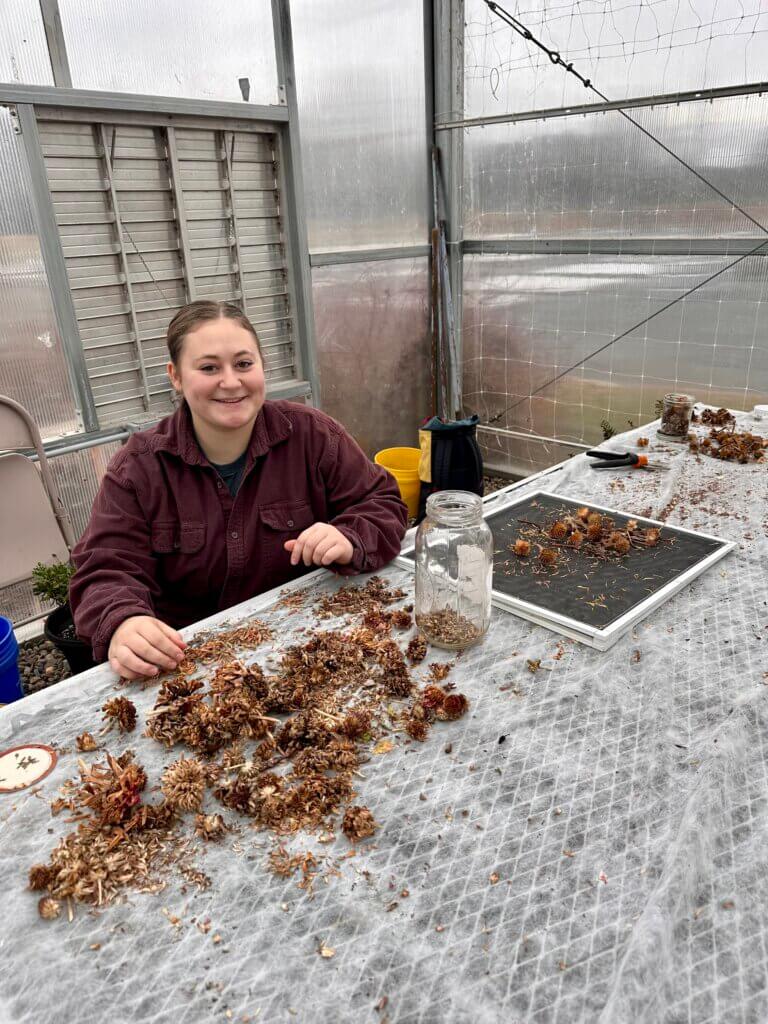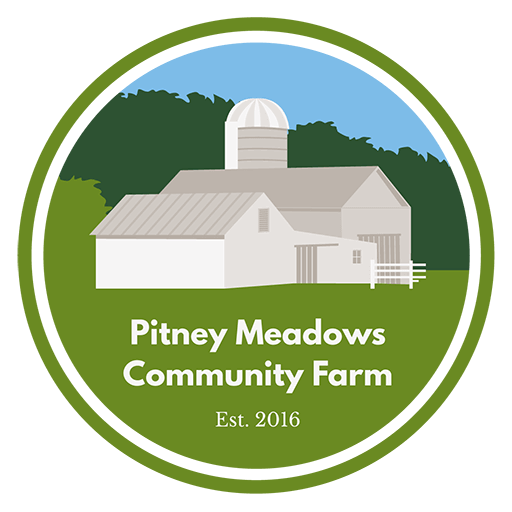Ava on Accessibility
On October 28th, our summer garden intern, Ava, presented a research project on accessibility at Pitney Meadows Community Farm with a focus on the Community Garden that she has been working on throughout her time here. In addition to this work, Ava has provided a tremendous amount of help in the garden by planting seeds, weeding, watering and harvesting produce for donations. She has continued to be a joyful presence for gardeners and anyone visiting!
The presentation was an open invite to all community gardeners and Pitney staff members. Ava covered what accessibility means to her, barriers to access, programs that Pitney currently has in place, and ideas for the future. One of the improvements she focused on was the design and building of two new garden beds to support people with physical limitations in the garden. At the end of the presentation, Ava opened up a discussion to the audience to learn more about the community’s insights and experiences.

Melissa: Ava, thank you so much for the work you’ve done researching new ways to implement accessibility on the farm. This is essential to the growth of Pitney Meadows and we are all thrilled that you’ve opened up the conversation to the community. Let’s start at the beginning, what made you interested in looking into accessibility on the farm?
Ava: I think when I was prompted by you (Melissa) to begin brainstorming about an internship project that would represent my time at Pitney this summer, many ideas came to mind but one of them stuck. In the spring, before I began my internship, I visited the Community Garden and noticed three different height options for raised garden beds with the tallest being the metal garden beds. During my time at Pitney I noticed the garden was full of people of all ages, backgrounds, experience levels who had different needs to make them successful in their gardens. I thought about this tabletop garden bed my family had gotten great use out of at home and after bouncing around ideas thought about making a raised accessible garden bed to accommodate for gardeners who need to be sitting down or prefer to be.
M: That’s great! Before this idea, have there been other projects that you were involved in regarding accessibility that inspired you?
A: Yes, I was able to get involved with accessibility work in high school, more so with the socioeconomic and financial aspects of that type of work in my community. I had such a rewarding experience working with local organizations along with “Her Drive” which is a non profit started by two college students based in Chicago. Through their leadership, my peers and I were able to host a collection drive for hygiene products and undergarments and donate to people and places in need in the Saratoga community. I realized how important and crucial it is to support everyone in your community.
M: Can you define accessibility for people who don’t know what that means?
A: Accessibility to me is the action of making people who may feel invisible in their existing environment feel valuable, visible and supported in that same environment. Making sure the system is able to provide for everyone in it just as equally, so everyone has the same opportunities. Some of the barriers that are common would be: lack of transportation, socioeconomic limitations, access to education and financial barriers. I found that a lot of people often struggle with not just one but are held back by multiple [barriers]. So, making the environment accessible helps to push against those barriers or support them to overcome these barriers and meet their respective needs.
M: Thank you, that’s helpful to understand. Can you briefly talk about next steps in the project?
A: The next steps after the presentation are to compile and collect feedback from gardeners and partners of Pitney, continuing the community discussion. From there my goal would be to partner with local organizations to make it more of a community effort. It would be great to work with The Joinery along with different volunteers to go ahead and assemble the bed(s) in the Spring.
M: What were some of the ideas and insights you received from the community that you’d like to explore even more?
A: There were a lot of really good ideas. One thing that really stuck with me was the transportation aspect of making Pitney more accessible. Even if we build the bed(s), what if the group or individual responsible for the bed doesn’t have a reliable way to get here? With the closest CDTA bus stop at the YMCA, the idea of crossing West Ave to get to the farm brought up the idea of implementing a crosswalk and sidewalks. This is one way to ensure safety and improve that barrier. We also talked about establishing a bus stop at Pitney in the future. These things give the potential to bring even more people to the farm. Not just those coming for the new raised beds perhaps, with the high school, the YMCA and now the senior center all so close by, more people would have access to all Pitney has to offer.
M: Yea, that would be really beneficial and I think feasible.. What do you see as the greatest barrier for Pitney either in these projects or general accessibility?
A: I think it is probably about communicating effectively that the raised garden bed(s) are a necessity and people will benefit from them. As well as trusting the process that it will and can be something that will boost the Pitney community to open more doors. Naturally, people are hesitant to make changes if things seem like they are going well so far, but if you never try to make changes then you would never know what the outcome might have been…. I have learned that it is most important to keep an open mind, be determined to make it work and see it through to the end.
M: I would agree, I think that’s a barrier we can overcome too or ensure that it doesn’t become an actual barrier. Going off of that, what did you take from the conversation (after your presentation) that was really hopeful in terms of the greatest strength for Pitney in pursuing these projects?
A: The conversation allowed me to see how supportive everyone is when you have an idea. Pitney is definitely a community of people who are really happy to see these new ideas and conversations coming to the farm. Hearing such positive insightful feedback about the project gave me hope that the raised bed will be able to serve someone who needs it. During the discussion it was mentioned by a community gardener that doing these accessibility projects brings forth a community of people who had previously felt invisible, that also gave me a lot of hope.
M: Is there anything that I missed that you want people to know about your presentation?
A: There's always room for more ideas. Brainstorming and bouncing around ideas is how we are able to come up with solutions and recognize ways to improve accessibility. I would say the people that make up Pitney’s community (staff, volunteers, gardeners, visitors, board members, etc.) have created this wonderful and rare community space in Saratoga and I feel that overall has done extremely well in working to make it an accessible place.
M: Do you want to briefly touch on some of the programs that you researched that exist here?
A: One program that inspired me is Unlimited Potential. Unlimited Potential provides transportation for their program members to come work on their own shared garden bed and harvest their produce throughout the season in the Community Garden. The organization aims to give the support needed to adults of different abilities so they are able to be successful. Also, I spoke with Daniel Williams, Food Sovereignty Coordinator at Pitney and talked about his ongoing projects with the local community to bring fresh produce to people who wouldn’t have access otherwise. Daniel has worked with partners of Pitney’s and has installed garden beds at various locations. The Farm Team at Pitney has made it a priority to donate fresh produce as they recognize everyone deserves to enjoy it.
M: Any parting internship wisdom you want to share? (although we hope Ava will return in Spring to finish the project)!
A: I would say that through this internship I was able to find such joy; this place and this community of people is amazing. I did not know how much I needed it and would enjoy all the farm had to offer. I loved every day here, it was an incredibly beautiful place to be all summer. I enjoyed the Community Gardeners who welcomed me, eagerly wanted to get to know me and allowed me to learn and grow. I was given such support by the team at Pitney, especially you. I am grateful to have been given the opportunity to experience an internship like this one and of course to eat fresh produce that I grew was really nice. I think it was a really great summer because of this internship. And I am so excited to continue this work in the future.
M: Thank you Ava! Lastly, what can people in the community look out for in the Spring regarding the project if they want to participate?
A: There may be opportunities for volunteers during this project and extra hands for support when we build the bed(s). We’re hoping to do a second presentation and discussion in Spring 2024 so be sure to keep your eyes peeled for information regarding that.
If you have any questions, comments, feedback before then feel free to email Melissa at contact@pitneymeadows.org. A copy of Ava’s presentation can be found here. Also, if this sparked your curiosity into learning more about Pitney’s food sovereignty program, check it out on our website!
